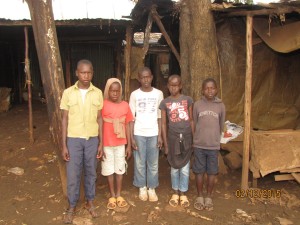
In last week’s blog post, we heard in their own words what Christmas means to five boys living in a Kenyan slum, enduring poverty that we could hardly imagine. If you haven’t read it, take a few minutes and read it here, then come back – you’ll have a much better appreciation of what I’m trying to say.
 Last Monday afternoon, when I read the responses of those children to the question, “What does Christmas mean to you?”, two things stood out above all else. One is theological, one is not. These kids, ages 11 and 12, understood that Christmas is a special day only because of Jesus’ birth. This should be obvious to us, but unfortunately many people today have lost sight of the profound spiritual significance of the holiday.
Last Monday afternoon, when I read the responses of those children to the question, “What does Christmas mean to you?”, two things stood out above all else. One is theological, one is not. These kids, ages 11 and 12, understood that Christmas is a special day only because of Jesus’ birth. This should be obvious to us, but unfortunately many people today have lost sight of the profound spiritual significance of the holiday.
But that’s not where I want this post to go. Instead, it was similar comments from two of the children that made a lasting impression on me. One boy, Bevan, referred to Christmas as a time when people “…eat delicious food like chicken…”, and another, Wilson, if given the opportunity would be “…happy as a king when I eat chicken and bread at a restaurant…”. You can probably guess what we had for dinner that night.
As I looked at my plate and back at the serving dish containing more chicken than my entire family could eat, Bevan and Wilson’s comments came back to me vividly. Their idea of an extravagant Christmas celebration is eating something we consume on an almost daily basis. We often look at chicken as something we eat when we can’t get a pork chop or a juicy steak, but to children deep in poverty, a piece of chicken is a meal fit for royalty.
You may think I’m telling you that the only way we can eat chicken is with a heaping side of guilt, but that’s not what I’m saying. We should consider it a great and undeserved blessing to be able to provide food for our families and ourselves. But we should ask ourselves, “Is that enough?” Is it enough to be well fed, well clothed, and comfortable? The responses these children gave bring a Biblical story to mind.
Jesus told the parable of the rich fool to a man in a crowd who was thinking only of material possessions (Luke 12:13-21). In the parable, a wealthy landowner had such a bountiful harvest that he said to himself, “What shall I do? I have no place to store my crops.” But he had a solution: “This is what I’ll do. I will tear down my barns and build bigger ones, and there I will store my surplus grain. And I’ll say to myself, ‘You have plenty of grain laid up for many years. Take life easy; eat, drink and be merry.’”
Content in his material abundance, the rich man neglected the most important thing: his relationship with God. Unfortunately, this decision led to his downfall, as God said to him, “You fool! This very night your life will be demanded from you. Then who will get what you have prepared for yourself?” The point Jesus was making is found in the last verse of the story: “This is how it will be with whoever stores up things for themselves but is not rich toward God.”
Now, much could be (and has been) written about what “being rich toward God” means – and it is an excellent topic to study and discuss. But before we can be rich toward God, we must first accept that Jesus has paid the penalty for our sins and made a way for us to have a relationship with God. That is the reason He came into this world as a humble infant that very first Christmas.
The mission of Feed the Hunger is to provide both physical and spiritual nourishment to those in need. Although the boys who were asked about Christmas struggle to have their physical needs met, they have their spiritual needs met in Jesus. On the other hand, many Americans, while physically satisfied, are starving spiritually. My prayer is that at Christmas this year, when you find yourself surrounded by more than you can eat, wear, or be entertained by, ask yourself, “Do I have that most important gift of Jesus?”
Matthew Byrd | Ministry Advancement Team